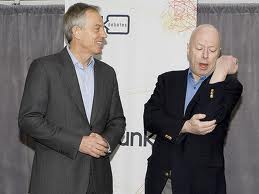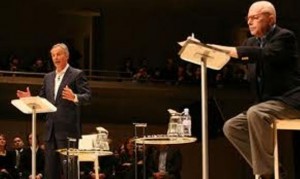Muscular Oratory vs. Christian Cant
At Toronto’s Roy Thompson Hall on Friday, mining tycoon and host Peter Munk’s meandering introduction finally gave way to what was billed a battle of ideas. Former British Prime Minister Tony Blair debated with ardent atheist Christopher Hitchens, over whether religion is a force for good in the world.
You’d think Tony Blair, who was given rock-star status, could dream up something. In Munk’s rambling ode he said Blair has made a greater impact than anyone else “on the events of the past 20 or 30 years.”
It was both questionable and cringe-worthy, but no more so than the Globe and Mail’s article calling him “a great British thinker on religion.”
On the contrary, it became clear the two men are of a different intellectual calibre – or were at different levels of preparedness, at the very least. Christopher Hitchens is a journalist and author of “God is Not Great, How Religion Poisons Everything.” Tony Blair is a perennial politician who appeared to have penned his arguments on the back of an envelope.
Hitchens couldn’t wait to lay siege to god and his itinerant spokesman, quoting the Apologia by John Henry Newman, a 19th century cardinal recently beatified by Pope Benedict XVI.
‘’The Catholic church holds it better for the sun and moon to drop from heaven, for the earth to fail and for all the many millions on it to die in extremist agony than one soul should tell one wilful untruth or should steal one farthing without excuse.’
This, said Hitchens, encapsulates the totalitarian nature of religion, a “celestial dictator, a kind of divine North Korea.”
And who but Tony Blair could defend a church that even now, refuses to prosecute pedophiles or punish those whom the Vatican knows to have brutalised children; that preaches the evils of condoms, condemning believers to prolonged disease and premature death.
He opened with vaguely positive platitudes about religion, lauding the merits of faith-based charities. “Almost half the healthcare in Africa is delivered by faith based organisations, saving millions of lives,” he averred. “A quarter of worldwide HIV/AIDS care is provided by Catholic organisations.”
Would those people have done these things without religious motivation? Impossible to say. But by Blair’s logic, we could also include among the great and good, heroin addicts, bent cops and the criminally insane, as long as they can count among their achievements a few acts of altruism. Sure, it’s hard to ignore the negative consequences of madness, drug addiction and pathological power trips, but maybe such states of mind are necessary to contribute to the Greater Good. Hard to say.
Conversely we do know of atheists, agnostics and humanists who do similarly good work with no other motivation than to help human beings, without bringing bibles to refugee camps and soup kitchens. This too, Blair admitted, effectively conceding that there was nothing unique to religious enthusiasts, nothing that only they could contribute that is beyond the rest of us.
 This question eluded Blair as he groped about for theological reinforcements, citing Rabbi Hillel’s invocation of the Torah, and its dictum that we do to our neighbour what we would want done to ourselves.
This question eluded Blair as he groped about for theological reinforcements, citing Rabbi Hillel’s invocation of the Torah, and its dictum that we do to our neighbour what we would want done to ourselves.
But far from being the sole preserve of Judaism, this sentiment is at the core of every major world religion. Indeed, Hitchens agreed, it “can be found in the heart of every person in this room.”
“Everybody knows that much,” he said, to growing applause. “We don’t require divine permission to know right from wrong. We don’t need tablets administered to us ten at a time in tablet form on pain of death to be able to have a moral argument. No, we have the reasoning and the moral persuasion of Socrates and our own abilities, we don’t need dictatorship to give us right from wrong.”
Blair’s argument continued to wither under the siege of his excitedly atheist adversary. Perhaps as interesting as Blair’s conversion to Catholicism in 2007 – while harbouring no regrets about his decision to invade Iraq – is the speed with which he recanted before our eyes.
He began with the confident claim that religion is a force for good. But he must have smelled doubt in the crowd, for before long he was saying, “I do not deny for a moment that religion can be a force for evil, but I claim that where it is, it is based essentially on a perversion of faith, and I assert that at least religion can also be a force for good.”
If a ‘thinker’ is one who contemplates how best to sell his pitch – and change it when necessary – then this Mister Blair sure is thinking. In no time, he strayed from the original motion (that he’s supposed to be supporting), to ‘religion can be a force for good.’
Soon he was beseeching us with outstretched hands, like a preacher at collection time. “I know very well that you can point and quite rightly as Christopher does to examples of where people have used religion to do things that are terrible, and that have made the world a worse place,” he says sheepishly. “But I ask you not to judge all people of religious faith by those people, any more than we would judge politics by bad politicians.”
By now he’s so diluted his insipid sermon that you wonder whether he’s changed his mind altogether. “Let us not condemn all people of religious faith because of the bigotry or prejudice shown by some, and let us at least acknowledge that some good has come out of religion, and that we should celebrate.”
See that? We’ve moved from “religion is a force of good,” to “some good” has come out of it. The poor bloke starts the evening proudly proclaiming the righteousness of the faithful, only to end by apologizing for everything from the Crusades to priests’ predilections for pre-pubescents, before getting ready to slip out the back door.
Prior to the show, Peter Munk lectured the live audience on what constituted a genuine debate (in case we’ve forgotten) for much of his excruciating 14-minute introduction. In the UK, where both Blair and Hitchens were schooled in the art of rhetorical jousting, they would have learned how to anticpate the cut and thrust of one’s intellectual opponent.
So it was surprising to see Blair cite the Northern Ireland peace process as an example of religion’s role in solving the world’s problems. It somehow escaped his notice that religion was the reason why the country was long at war with itself in the first place.
“Where does the religious divide come from?” Hitchens wondered.
“Four hundred years and more, in my own country of birth, of people killing each others’ children, depending on what kind of Christian they were, and sending each others’ children in rhetoric to hell, and making Northern Ireland the place, the most remarkable in Northern Europe for unemployment, for ignorance, for poverty and for, I would say, stupidity too. And for (religious leaders) now to say, maybe we might consider bridging this gap, well, I should bloody well think so.”
And so it continued, throughout the long evening: Blair lurching about in search of something good to say about religion, and Hitchens rebutting his vague assertions with one grim reality check after another.
In the event, 32% of the audience voted in support of the motion that religion is a force for good, while 68% of the audience were opposed – a modest shift in the numbers from the start of the evening. Neither managed to significantly alter audience opinion. While their combined rhetorical skills drew large crowds to Roy Thompson Hall, they wielded in the end, only so much power over the eyes and ears of those who bore witness.
Long before this debate, these very men agreed on something of far greater consequence: the decision to invade Iraq. Perhaps in keeping with Cardinal Newman’s fundamentalism, Blair stands by the steps that led to the inevitable bloodshed that continues to this day. Christopher Hitchens maintains his support. Maybe the unchanged minds in the audience took the whole spectacle in with a shrug, and a pinch of salt.


